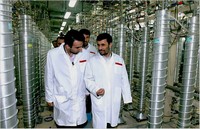U.S. Officials Think Iran Might Have More Undisclosed Enrichment Plants
At a landmark session that included the highest-level bilateral contact between U.S. and Iran in years Iran and six world powers put nuclear talks back on track The meeting ended with a pledge to meet again this month. Disputes, however, surfacing shortly after its conclusion indicated a rough road to agreement ahead.

Iran accepted a demand Thursday at the talks in a villa outside Geneva to allow U.N. inspectors into its covertly built enrichment plant, in a move that appeared to defuse tensions that had been building for weeks.
Western officials at the session said the Islamic republic had also agreed to allow Russia to take some of its enriched uranium and enrich it to higher levels for its research reactor in Tehran, a potentially significant move that would show greater flexibility by both sides, CBS News reports.
In the meantime, President Mahmoud Ahmadinejad said on Wednesday that "some countries" had offered to provide Iran with uranium enriched to 20 percent for use as nuclear fuel, the official IRNA news agency reported.
"There have been some proposals by individual countries and groups of countries. We are ready to hold talks with anyone interested. Our experts will soon start talks with those sellers," he said.
Western diplomats say Iran agreed in principle at last week's talks in Geneva to send about 80 percent of its stockpile of low-enriched uranium to Russia and France for further processing and return to Tehran to replenish dwindling fuel stocks for a reactor in the capital that produces isotopes for cancer care, Reuters reports.
It was also reported, president Barack Obama has warned Iran to come clean about its nuclear program, which Washington fears is a cover to build atomic weapons, or face "sanctions that bite." Tehran says its program is designed only to produce electricity.
Washington has had restrictions on U.S. business dealings with Iran for a long time. But the disclosure of the plant -- it is the second such facility acknowledged by Iran -- has prompted both Congress and the Obama administration to take a closer look at expanded sanctions in the standoff.
Meanwhile, Deputy Secretary of State James Steinberg, who also testified, said the dangers posed by nuclear weapons were the reason why "nothing is off the table" in dealing with Tehran's nuclear program.
Steinberg also acknowledged that Iran's failure to publicly disclosed the underground enrichment plant near Qom until last month indicated there "might be" other such undisclosed installations in Iran, Reuters reports.
Subscribe to Pravda.Ru Telegram channel, Facebook, RSS!


